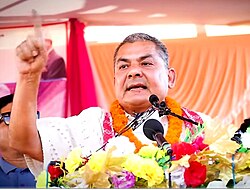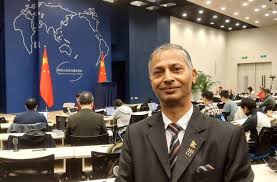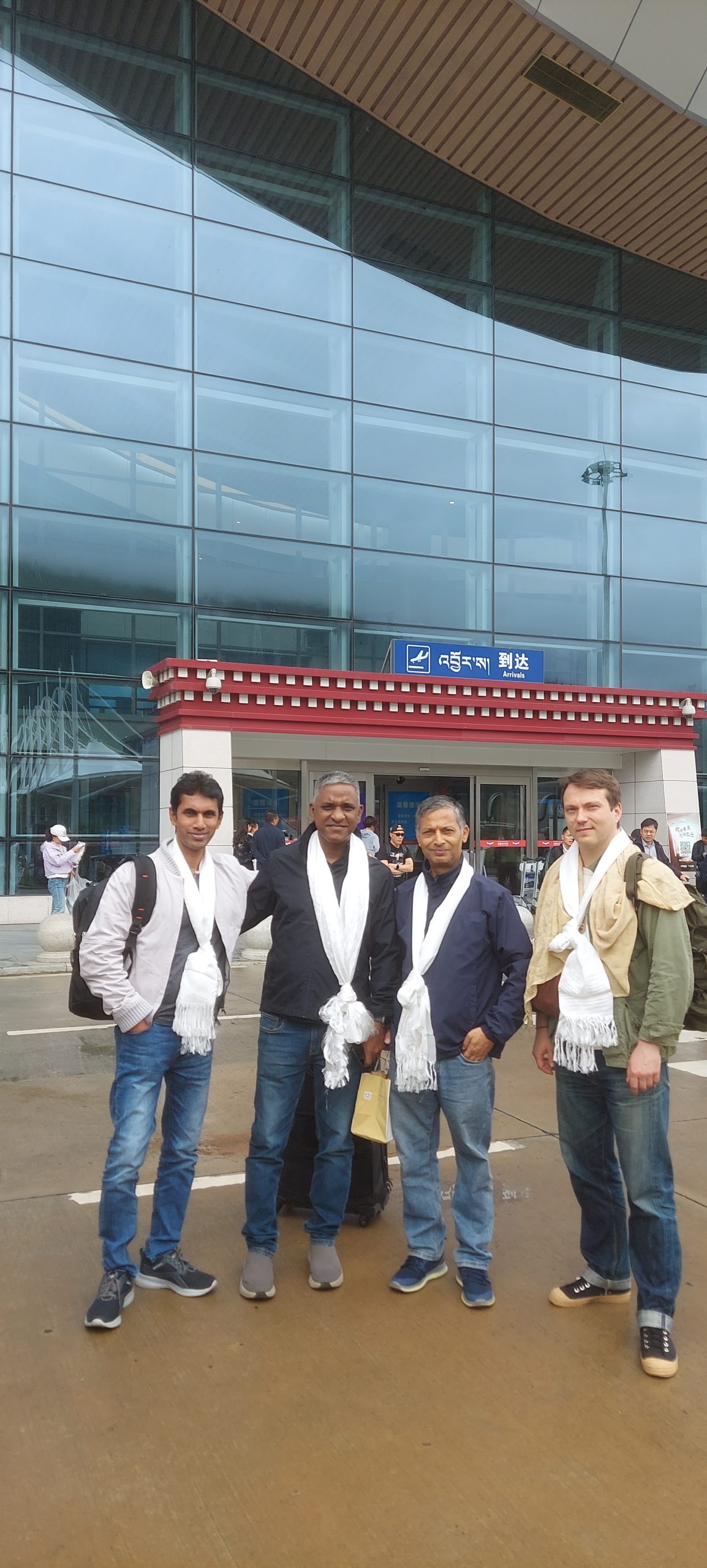
By Dr Janardan Subedi
I’ll be honest: I'm not a fan of Durga Prasai. Nor am I here writing fan mail. I have no personal stake in whether he wins or loses. I’m just…watching. And for the past two years, I’ve been watching him like you watch a car crash you can’t look away from. Except this one’s interesting. He doesn’t swerve, he doesn’t crash, and somehow the whole thing makes sense.
Nepal is a place where politicians are like people selling snake oil in the middle of a storm. Promises are everywhere, but no receipts. Credibility? That’s a fairy tale. They speak in fancy circular sentences, sprinkling in invisible asterisks that read: “Terms and conditions change when convenient.” And then comes Durga Prasai. No gimmicks. No dancing for applause. Standing up for the “Bhuimaanchhe”—ordinary people whose rights have been stolen, ignored, or laughed at for decades. And he does it without pretending it’s a reality show.
Let me emphasize this: I’m not watching him cheerfully. I’m not waiting for the highlight reel. Watching him is like watching someone walk a tightrope while everyone else juggles chainsaws. You expect a slip. But nope. Two years, zero deviations, zero theatrics. He says something, he does it. It isn’t very respectful how consistent he is.
“Consistency doesn’t equal honesty,” you say. True. Anyone can repeat a lie. But here’s the catch—he hasn’t lied. Not once in public. Every claim is supported by evidence that you can verify yourself. Unlike typical politicians who fight for the people while lining their own pockets, Durga Prasai’s words align with reality. His message is consistent, and the proof he provides about those who have “sucked the country dry” is clear. You could teach a course on accountability using his reports as textbooks.
And the haters? Oh, they’re there. Usually, it’s the folks who feel threatened—those with cozy little empires of corruption. They launch attacks, spread negative stories, and hope people buy into it. The funny thing is, if you look at the source, the smoke clears right away. The criticisms aren’t neutral—they’re defensive. Desperate. Transparent if you pay attention.

Let’s talk about “Bhuimaanchhe.” These are the marginalized people who’ve been getting the short end of the stick while the elites partied. Taxes paid, lights out, promises broken. And Prasai? He doesn’t swoop in as some superhero. He’s more like the guy who names the thieves while ensuring the security cameras caught them. Names, facts, evidence—check, check, check. And the impact of his work on the 'Bhuimaanchhe' is clear. For example, his relentless pursuit of justice for a land dispute in a rural village has resulted in the land being returned to the local farmers.
I’ve noticed something else: his voice never wavers. Unlike many politicians who change their stance depending on who’s watching or paying attention, Prasai stays true to facts. His consistency can be exhausting to watch, but in an almost endearing way. It’s like watching a perfectly disciplined athlete, except instead of running a marathon, he’s running a marathon of accountability in a country that’s allergic to it.
Can he actually accomplish anything? Maybe. Maybe not. Movements rarely follow a straight path. Change is a slow process, not a quick fix. But here’s the key point—even if he doesn’t win every battle, his approach still matters. The precedent matters. Someone is holding power accountable, documenting it, naming names, and refusing to sugarcoat reality. That’s revolutionary in a country where people celebrate performance over truth.
Think of it like a comedy show. Most comedians pander to get applause. Durga Prasai is the one delivering the uncomfortable truth, wrapped in observation, that makes you laugh and squirm at the same time. Not flashy, not convenient, but precise, relentless, and real. Watching him is like watching a perfectly timed joke land—except the joke is a fact about corruption, and the punchline is uncomfortable but necessary.
And the negative narratives? Those don't come from neutral commentators. They’re from people whose secrets are being exposed. Human nature, really. When the spotlight hits your corruption, you complain it’s too bright instead of fixing what’s in the dark. And in Nepal, that spotlight can be dangerous. But he keeps going. Consistency, my friend. Consistency. Some might argue that his approach is too confrontational and could cause more conflict. However, it's important to remember that he's not seeking conflict, but rather standing up to it in the name of accountability.
Many people misinterpret his quietness as a sign of passivity. Let me clarify—he’s not quiet. He’s intentional. He chooses his battles, documents every detail, and delivers with precision. Unlike loud politicians who yell for attention while secretly ignoring the evidence in front of them, Prasai’s work is methodical. It’s a slow, relentless march. In a system that rewards noise over substance, the difference between his approach and that of other politicians is clear, making his work even more meaningful.
Sure, he might not succeed at everything. The powers he challenges are formidable: resourceful and ruthless. But the act itself—standing up, documenting, naming names—is a message louder than any applause. In a society used to spin and manipulation, that’s a quiet kind of revolution.
The more I watch, the clearer it becomes that his value lies not only in potential outcomes but also in the approach he takes. Facts. Clarity. Consistency. Rare qualities. Most movements roar then fade away. Durga Prasai’s work is like building brick by brick, creating a wall strong enough to withstand scrutiny, even if the roof isn’t finished. His work is not just a process but a meaningful contribution to the future of Nepali politics.
Two years of observation have also shown me that fear plays a significant role in politics here. Most people, leaders, and activists shy away when the stakes are high. Prasai doesn’t. He faces criticism, threats, and attacks head-on. His courage, combined with clarity, makes him a unique figure in Nepal’s landscape. Watching him reveals the laziness of opportunism—it shows how rare it is for someone to stay focused without compromise. His unwavering bravery is an inspiration and a beacon of hope amid the murky waters of Nepali politics.
I visited his “empire” in Jhapa and saw firsthand what he has built—the vast scope of service, the many people whose lives are touched every day. I spoke with residents, and the gratitude and respect for Durga Prasai were clear; it isn’t just hype, it’s a genuine experience. I also spoke with doctors at his hospital, and their respect for his professionalism was evident, even among those with many years of formal training. Yes, his language is rough, and his education might not match traditional academic standards. Still, he has a doctorate from the university of life itself—a PhD in observing, acting, and delivering. He never claimed to be part of an elite; he always identifies as a representative of the “Bhuimaanchhe,” the ordinary people whose struggles are often overlooked. His authority doesn’t come from titles but from real results and steadfast dedication.
Now, I understand what some readers might think: “Ah, he’s part of Durga Prasai’s inner circle, a secret ally, a behind-the-scenes accomplice.” Fine. Let them believe that. I don’t lose sleep over assumptions. I’m not here to wear political masks or pretend to be a cheerleader. I care about truth, and truth isn’t partisan—it’s based on evidence. If anyone has a counterpoint, bring it. Show the facts. The beauty of integrity is that it doesn’t fear scrutiny. It welcomes it. So, speculate, whisper, accuse—doesn’t matter. I’ve spent two years watching, documenting, checking, and verifying. The narrative isn’t spun; it’s observed. And evidence, unlike rumors, doesn’t get tired, distracted, or forgetful.
Ultimately, whether he reaches every goal matters less. The fact that he’s trying at all is incredible. In a country where truth and accountability are often seen as optional, someone who stays true to facts is an exception. And exceptions are where hope resides.
I observe. I record every statement, piece of evidence, attack, and stance he takes. I am neither cheerleader nor critic—I am a witness. Through witnessing, I perceive clarity, consistency, and courage. The path ahead is uncertain. Obstacles will arise. Resistance, cynicism, betrayal—everything is likely. But the act itself? Loud and clear. Accountability matters. Facts matter. And the “Bhuimaanchhe” deserve to be heard.
Two years of observation have taught me this: integrity, even without fanfare or allegiance, can still be recognized. Sometimes, recognition alone is enough to shift the conversation, even if it doesn't immediately change the outcome.
So, let’s avoid getting sidetracked by fan clubs or haters. Watch, observe, and maybe learn a little. Because in a world where consistency is rarer than gold, noticing someone stick to facts is worth paying attention to—and worth writing about.













Comments:
Leave a Reply